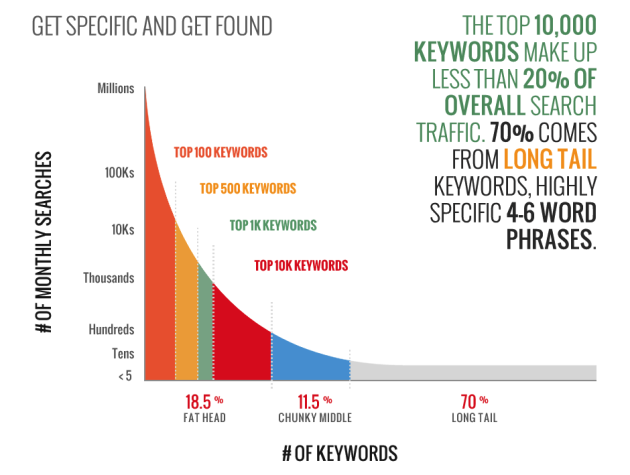What are Short Tail Keywords?
Short Tail Keywords are broad phrases people use when searching in search engines that only have one or two words.
Short tail keywords are search phrases with only one or words. Their length makes them less specific than searches with more words.
“Egg” (1 word) is an example of a short tail keyword, whereas “Make scrambled eggs fluffy” (4 words) is a long tail keyword.
Individual short tail keywords are searched more often than individual long tail keywords, but highly specific phrases make up the vast majority of search volume.
Bill Trancer put this into perspective in a 2008 post analyzing Hitwise data.
There’s so much traffic in the tail it is hard to even comprehend. To illustrate, if search were represented by a tiny lizard with a one-inch head, the tail of that lizard would stretch for 221 miles…”
The Tail
The term “short tail keyword” is the opposite of a “long tail keyword,” so understanding the term “long tail” informs what is meant by short tail.
The descriptor “long tail” is a nod to a concept in statistics that describes a distribution of data which has signifiant results away from the “head.” In the chart below the head is in green, and the tail is in yellow.
Chris Anderson helped popularize the term “long tail” after writing the book, The Long Tail.
Here’s how the long tail relates to search engines. Below, the number of words per search is graphed on the x-axis and the volume of searches is graphed on the y-axis.
Short tail keywords appear within the “fat head” part of this chart.
In online advertising, short tail keywords are more competitive. In other words, more advertisers are bidding to place ads on the most popular search engine result pages for shorter, more common phrases.
Pinning advertising to long tail keywords can lead to improved ROI for your SEO. You can see better results from bidding on many long tail keywords rather than wasting your budget on one or two highly competitive phrases.
Short Tail Keyword Resources
Short Tail Keyword Experts
Synonyms
- broad, general keywords
- competitive keywords
- short tail search phrases



